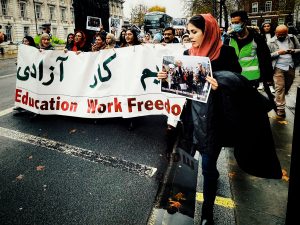On July 2, a day after the two-day U.N.-convened meeting on Afghanistan ended in Doha, a side meeting was organized in the same venue. Eight people, representing Afghan women and civil society groups, participated. This appeared to be a conciliatory gesture by the U.N. after it excluded women and civil society groups from the main meeting. Strangely, however, it withheld the names of the participants of this rendezvous, thereby inviting criticism from larger Afghan groups that the people who attended were Taliban supporters.
In line with such an allegation, Madina Mahboobi, who identified herself as one of the participants, tweeted about the points she raised in the meeting. She claimed to have called for engaging the Taliban and looking beyond the “political agenda” of an inclusive government in Afghanistan. Her prescription for a peaceful solution to the “Afghan crisis” is “engagement and dialogue” with the Taliban. She said that the issue of “girls’ education and human rights” are agendas being run by “actors outside Afghanistan.”
Mahboobi is seen as a Taliban sympathizer by some and claims to head an NGO in Afghanistan, which she does not name. She has nevertheless addressed U.N. meetings, previously calling for recognizing the Taliban regime and has been criticized within the country for her views that endorse restrictive policies on women. Her inclusion in the side meeting is viewed by other excluded women groups as the U.N. reaffirming its altered position on how to break the Afghan deadlock.
Not surprisingly, Doha 3 was a fruitless endeavor, just like its two previous episodes in May 2023 and February 2024. However, while in prior instances the U.N. could claim to have held on to its principled position on women’s rights, this time around it was seen as a surrender. The U.N. went against its principled stand, its 2021 description of the curtailment of women’s rights as “gender-based apartheid,” and that of its own secretary-general to ensure that the Taliban’s conditions for attending the meeting were met and that no Afghan civil society and women groups came face to face with the Taliban in Doha. Consequently, the meeting provided a Taliban team, headed by its spokesperson Zabihullah Mujahid, with a global platform to assert the unrecognized regime’s regressive views.
Curiously, the meeting’s agenda included governance and counternarcotics, areas where the Taliban repeatedly claim to be performing exceptionally. Mujahid topped it up by calling for the lifting of sanctions on the regime and asked the Western countries to engage with the regime following the examples of Russia, Saudi Arabia and Kazakhstan. He didn’t touch upon the issue of women’s rights, although in the past he has described the Taliban policies on them as an internal issue of Afghanistan.
Afghanistan is a signatory to several international treaties that guarantee human rights for women and girls, including the Convention on the Elimination of All Forms of Discrimination Against Women (CEDAW) and the International Covenant on Economic, Social and Cultural Rights (ICESCR). However, these were signed by the deposed Republican government and the Taliban supposedly do not consider these commitments binding. What is more troubling is that the Taliban seems to have found a way to circumvent the attention on its regressive policies and condescending attitude toward women’s rights, which disturbingly includes sexual violence against women activists, by leveraging its attendance at the U.N. meeting.
Hundreds of women and girls including a woman activist whom the Taliban gang-raped within the confines of a prison have been forced to leave the country. They now raise their voices from the safety of the third countries. Thousands of others, however, haven’t been able to escape and are being forced to reconcile with the reality in Afghanistan. This includes Frozan Ahmadzai, who aspired to be a doctor but is forced to sew clothes and make pickles from a basement in Kabul. Irrespective of what the U.N.’s considerations are for sidelining Afghan women, the yearning for the restoration of women’s rights within Afghanistan remains as strong as ever, braving great odds and repugnant Taliban violence.
Contrary to what Mahboobi termed as “external actor sponsored,” the demand to take these issues seriously is spearheaded by Afghan women of all hues both inside and outside the country. Take, for example, the WomanPost movement launched on February 11, 2024, to use the influence of public figures for achieving gender equality in Afghanistan. Incorporating celebrities, public figures, sports athletes, human rights activists, journalists, and artists, WomanPost aims to support Afghan women and promote gender equality. Clearly, whether a woman who is advocating for gender equality is inside Afghanistan or outside is no criterion for trivializing a crucial issue that affects 50 percent of the Afghan population.
The U.N. still provides significant sums of financial assistance to Afghanistan and runs projects that benefit Afghans. Mujahid’s statement in Doha summed up the hunger of the Taliban regime for global recognition. It is surprising, therefore, that no attempts are being made to leverage that desire to make the regime bend backward. The Taliban certainly need to be engaged. But it can’t be at the cost of the rights of women and girls. The U.N. has missed the bus by excluding them from the agenda while engaging the Taliban in Doha on their terms. It’s time that the U.N. rediscovers its purpose next time around with a clearly crafted strategy and road map for the inclusion of women and other groups in such meetings.
































